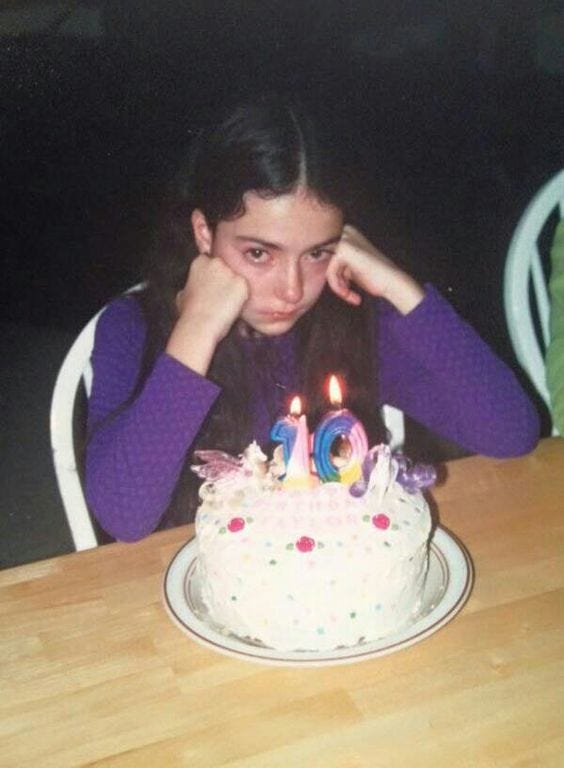my anxieties have levels, self mantras to make you cringe, tongue scraping, and how to get ready for therapy
Hello.
I don’t know if your anxieties are like this, too, so let me explain…
My anxieties have different levels.
I have baseline anxiety that feels tolerable. I acknowledge that it’s there, but it doesn’t impact my daily tasks- kind of like background noise. Sometimes it’s a little heavier, like a dull ache. But nevertheless, tolerable.
Then I have mid-level anxiety. It’s still tolerable enough that I can romanticize it. Long commutes with my headphones in playing sad girl playlists, staring out the window and it’s raining type of vibe. It impacts my day in a negative way and it can be all-consuming, but I’m able to bury it during work hours or if I need to focus on a project. Or if I’m with a friend (depending on how close I am with this person), I can hide it during our time together, then let it resurface when I’m alone again. This level of anxiety or depression can be leveraged for great sad girl content (specifically for writing or creative purposes).
Then there’s top tier anxiety. This is not romantic nor is it tolerable. It’s physical, and sometimes manifests into panic attacks, a racing heart, or stop-you-in-your-tracks-need-to-call-off-work-and-cancel-all-plans sort of anxiety. There’s no room to be creative. It’s scary and debilitating. It’s all-consuming. You start to convince yourself that you’re physically ill. The hypochondriac in you runs wild. The only option is to ride it out or nap if you’re lucky. This type of anxiety only has room for comfort content. What is your comfort content, reader? My comfort content has always been food. Food media, food magazine, food content creators (but I’m very specific about who). Even the activities I engage in (if able) revolve around food- cooking a wholesome meal, baking for a neighbor or friends. Sometimes nostalgia helps- rewatching shows that brought me comfort as a child (little bear) or reading stories from my childhood that felt comforting (beatrix potter and winnie the pooh) (believe me there are more). But this helps me and simultaneously heals my inner child.
For the past year and a half I’ve been riding the wave of top tier anxiety (almost daily). Rarely do I have moments of peace or calm and very rarely do I feel like I can inhale a take a deep breath, drop my shoulders, and relax. I’d like to think that there are good things ahead in the near future. Cautious optimism. But that’s a slippery slope, especially if you’ve gotten your hopes up and been let down time and time and again.
I write this to you with zero solution, but rather, a voice of comfort if you’re feeling this way, too. Figuring out my comfort content has helped. I encourage you to find yours. Even if you’re not feeling top tier anxiety right now, you can have a tool in your back pocket if it comes back and resurfaces.
Okay, moving on now. Let’s get into today’s interesting articles.
Read with me:
The concept of preparing for psychotherapy underscores the proactive role patients can play in their mental health journey, emphasizing the importance of intentionality and active participation in the therapeutic process. This approach not only demystifies the therapy experience but also empowers individuals by highlighting the significance of their input and readiness, thereby fostering a more collaborative and effective therapeutic relationship.
Psyche
How Many Dimensions Are There, And What Do They Do To Reality?
The exploration of space's geometry from a three-dimensional perspective to multidimensional theories in physics underscores a profound shift from Aristotle's concept of place to a complex, abstract understanding where space can encompass up to 24 dimensions or more, as posited by string theory. This progression from Euclidean space to the intricate landscapes of Calabi-Yau manifolds in theoretical physics not only challenges our sensory experience of the world but also hints at the unfathomable complexity underlying the fabric of the universe, suggesting that what we perceive as physical space may just be an emergent property of a more fundamental, quantum-level reality.
Aeon
Is Oat Milk Unhealthy? That’s The Wrong Question
The debate over whether oat milk is inherently good or bad for health is overly simplistic and overlooks the nuanced reality of nutrition, which varies greatly depending on individual health conditions, dietary habits, and consumption levels. While concerns about oat milk's potential to spike blood sugar due to its starch content are valid, especially for individuals with diabetes or insulin resistance, for most people, moderate consumption of oat milk is unlikely to pose significant health risks. Additionally, the discussion around oat milk should extend beyond just its health implications to consider other important factors such as environmental impact, ethical considerations regarding animal welfare, and personal preferences, highlighting the importance of a more holistic approach to dietary choices.
Vox
Tongue Scraping - Niche But Necessary
Tongue scraping, a practice popularized on platforms like TikTok, is based on the idea of removing bacteria and debris from the tongue to reduce bad breath. The science indicates that a dense population of bacteria, particularly anaerobic types in the tongue's crevices, can produce sulfurous compounds responsible for halitosis. While there's a historical precedent for tongue cleaning in various cultures, contemporary research, though limited, suggests it can be beneficial for oral hygiene and bad breath management when combined with other practices like brushing and using antibacterial sprays. However, the method and frequency of tongue cleaning should be approached with caution to avoid potential damage to the tongue's sensitive tissue, keeping in mind the balance between potential benefits, such as improved social interactions, and risks, including unintended impacts on oral and possibly overall health.
BBC- Science Focus
How Big Tech Is Fueling Dating App Addiction
The lawsuit against Tinder and Hinge, accusing them of fostering addictive behaviors through gamification, underscores a broader concern about the impact of dating apps on users' mental health and social interactions. Despite the intention of these platforms to aid in finding love or companionship, their design—emphasizing infinite swiping and dopamine-driven feedback loops—can lead to compulsive use rather than meaningful connections. This design strategy, while profitable for the companies, may paradoxically undermine the very purpose of these apps by prioritizing user engagement over genuine relationship building. As users like Katie and Joe express disillusionment with the efficacy of these platforms in fostering real connections, the challenge lies in reconciling the commercial motives of these apps with the genuine desire for intimacy and companionship among their users.
Dazed
Maya Man’s Self-Help Mantras Are Designed To Make You Cringe
I adore Maya. Her “FAKE IT TIL YOU MAKE IT" leverages the allure of self-help mantras and the glossy aesthetics of social media wellness culture to critique the performative nature of online femininity and self-optimization narratives. Through algorithm-generated artworks that parody the language of empowerment with unsettling aphorisms, Man exposes the hollowness and potential toxicity of these seemingly motivational messages. Her work reflects a broader commentary on the cyclical trends of idealized femininity online, from the girlboss ethos to the current chaos aesthetic, questioning the authenticity and impact of these digital personas. The transition of her digital art into physical spaces and merchandise further blurs the lines between online performance and tangible reality, inviting reflection on the interplay between our online selves and our lived experiences.
Dazed
How To Deal With An Existential Crisis
The analysis illuminates the nuanced nature of an existential crisis as described by Søren Kierkegaard, emphasizing the detrimental impact of living without passion and the societal obsession with objectivity over subjective human experiences. Kierkegaard's call for individuals to find their own subjective truths and to embrace passion as a means to unify existence and counter melancholia highlights a deeply personal journey towards fulfillment, challenging the alienation induced by societal norms.
Psyche
That’s all for today.
Bye <3





